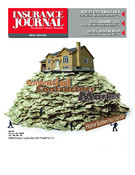NCOIL Model Addresses Use of Claims, Inquiries in Underwriting Homeowners
Consumers who initiate a homeowners insurance claim but never receive payment could find that single incident may be used by their insurer to cancel their policy, or raise their premium, under a new claims history model law that is being sent to states for consideration.
State insurance legislators belonging to the National Conference of Insurance Legislators adopted the model law that governs insurer use of claims history, including inquiries and claims without payments, in personal property insurance. The group’s executive committee adopted the proposal in a 31 to 7 vote after more than a year of consideration within NCOIL of the issue. It is now up to individual state legislatures to decide whether to adopt the model.
The executive level approval came during the NCOIL July meeting in Newport, R.I., following a debate by the property casualty committee, chaired by Rep. George Keiser (N.D.). During Keiser’s committee hearing, the insurance industry won several amendments while critics complained that there was too little consumer input into the provisions.
The final model legislation, sponsored by state Sen. David Bates (R.I.), would impose some restrictions on insurers’ use of claims history in deciding whether to deny, cancel, non-renew or set rates for homeowners or personal residential property coverage.
The final model act would prohibit an insurer from taking an adverse action based solely on the claims history of a previous property owner; prohibit taking an adverse action based on consumer inquiries; prohibit using claims experience of the property or a new applicant that is more than five years old; and largely prohibit using claims experience to underwrite coverage more than 30 days from when an insurer issued a coverage binder.
It would also require an insurer to re-underwrite and re-rate a policy within 30 days notice that claims information was incorrect or incomplete, and then return any overpayment to the insured.
Regarding claims without any payment, or CWOPs, the model act would prevent an insurer from using CWOP information unless more than one such event occurred within the previous three years or such a claim “affected the nature of the risk and was predictive of future loss.”
Looked at another way, the model act would permit an insurer to use a single incident without a payment in its rating if the insurer determined that the claim was predictive of future loss. Barring that determination, an insurer could only use the incident if there had already been a similar incident within the past three years.
One-incident provision hit
Sen. Steven Geller (Fla.) and others argued against permitting insurers to use the trigger of more than one incident within three years as an excuse to change rates, noting that the original proposal called for more than three incidents within a three year period “That’s not predictive,” Geller said of the one incident provision.
Testimony from consumer groups at previous meetings raised concerns that policyholders might be penalized for mere inquiries about a loss, even when no claim was filed, and for claims filed by previous owners of their homes. They also balked at penalizing insureds for filing claims due to catastrophes such as hurricanes or windstorms.
The NCOIL model bans the use by insurers of claims field by a previous property owner. It does not exclude catastrophe claims from a history database, however.
While the model appears to prohibit the use of mere inquiries by insureds, the matter of when an inquiry becomes a CWOP concerned some of the legislators during the property casualty committee hearing.
An inquiry is defined as a “telephone call and other communication made to an insurer regarding the terms, conditions or coverage afforded under an insurance contract that does not result in a claim, including questions whether a policy will cover a loss or the process for filing a claim.”
The language in the proposed law prohibits insurers from counting mere consumer inquiries to insurers as incidents, but several lawmakers urged stronger language. They maintained that in some states agents are required by law to report any known loss to their insurance companies even if no claim is filed. But Rhode Island State Sen. Bates, who is also an insurance agent, maintained that most agents would not inform an insurer about an inquiry. He could not say what an insurer would do if an insured called directly.
Florida Sen. Geller cited an example of a homeowner insured who was penalized by his insurance company after telling his agent about a theft from the trunk of his automobile even though he never filed a claim for the items under his homeowners policy.
“I am concerned about someone asking an agent, ‘What should I do?’ and then that becomes a CWOP,” Geller said. “It chills the opportunity to discuss issues with agents.”
Wesley Bissett, senior vice president of state relations and government affairs for the Independent Insurance Agents & Brokers of America, replied that the intent of the model was not to discourage consumers from seeking advice from agents but he acknowledged there might be a problem with some non-qualifying incidents ending up in a claims database as CWOPs.
Insurer representatives insisted that CWOPs are highly predictive, prompting Vermont Rep. Virginia Milkey to inquire as to just how predictive they are. That depends on the insurance company, was the answer she received. Robert Zeman, lobbyist for the Property Casualty Insurers of America, told legislators that homeowners insurance companies vary in how much weight they give claims history just as they vary in their use of other rating variables.
Lawmakers also debated when an insurer should disclose to an insured that claims history has been used. The final version allows that, upon the consumer’s request, an insurance company must tell the policyholder what claim information led to an adverse action. A motion to require insurers to notify insureds about any adverse action without the consumer having to ask failed over concerns it would be costly. Insurers would still be required to abide by the disclosure requirements set forth in the Fair Credit Reporting Act, several observers noted.
Many insurers report to and use CLUE (Comprehensive Loss Underwriting Exchange), a claims database that is maintained by a third party, ChoicePoint. CLUE reports are protected by the Fair Credit Reporting Act and can only be accessed by the owner or lender for the property.
The CLUE files contain policy information such as name, date of birth, and policy number; claim information such as date of loss, type of loss and amounts paid; and a description of the property covered. For homeowners coverage, the report includes the property address and for auto coverage, it includes specific vehicle information. The database contains up to five years of history.
Third party, seller disclosure
The recommended law would require ChoicePoint and other keepers of claims databases to disclose the codes, classifications and guidelines they use to any state insurance department that asked for the information.
Another provision in the model legislation would require sellers of single-family dwellings to provide in writing to buyers information on all insurance claims involving the property within the previous five years.
The claims history measure was introduced as a “consensus” bill but several lawmakers who voted against it claimed that the only consensus was within the insurance industry.
“Maybe the insurance industry agreed but who else?” commented Geller, an outspoken critic of the law.
Birny Birnbaum, executive director of the Austin, Texas-based consumer advocacy group, the Center for Economic Justice, has had little good to say about the NCOIL model. In a recent commentary in Insurance Journal, he dismissed NCOIL’s attempt as a “model that provides no consumer protection and allows insurers to continue abusive practices.”
The consumer activist has called upon another organization, the National Association of Insurance Commissioners, to outdo NCOIL and develop a stronger model based on North Dakota’s regulation.
“What’s needed is a different approach to regulating what types of information insurers can use for underwriting, rating and claims settlement. Instead of allowing insurers to use any and all types of information in any way they please until a regulator, consumer or legislator happens to discover an abusive practice, the new approach should be to allow the use of new information–new risk classifications–only with prior approval of the insurance regulator,” Birnbaum wrote.
According to the NAIC, which has been working on its own recommendations, about 16 states have enacted legislation relating to insurers’ use of claims databases.
The NCOIL draft does not address the use of claims history in underwriting auto insurance. It also does not address the use of credit history in personal lines. The NCOIL Model Act Regarding the Use of Claims History Information in Homeowners and Personal Lines Residential Property Insurance was first considered in November 2004. A copy of the final model act can be found at www.naic.org.
Topics Carriers Agencies Legislation Claims Underwriting Property Homeowners Market
Was this article valuable?
Here are more articles you may enjoy.


 Charges Dropped Against ‘Poster Boy’ Florida Contractor Accused of Insurance Fraud
Charges Dropped Against ‘Poster Boy’ Florida Contractor Accused of Insurance Fraud  Former Ole Miss Standout Player Convicted in $194M Medicare, CHAMPVA Fraud
Former Ole Miss Standout Player Convicted in $194M Medicare, CHAMPVA Fraud  GEICO Settles Call-Center Worker Suits for $940,000; Attorneys Get Half
GEICO Settles Call-Center Worker Suits for $940,000; Attorneys Get Half  AIG, Chubb Can’t Use ‘Bump-Up’ Provision in D&O Policy to Avoid Coverage
AIG, Chubb Can’t Use ‘Bump-Up’ Provision in D&O Policy to Avoid Coverage 


